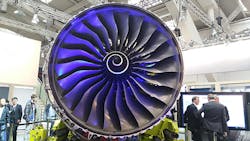Igniting Industrial Growth: Jumpstarting Emerging Industrial App Economy
“There’s an app for that.”
Everyone knows the phrase. As consumers, we live in a world of apps. We track mileage and heartrate on our morning run, set a reminder to call the doctor’s office when it opens, reroute our commute to avoid traffic delays and stream music while we go. And that’s just before 8 a.m.
Now machines are joining the game. In fact, machine data is growing twice as fast as other data, making Big Data even bigger. As the industrial world gets online, jet engines, wind turbines, railway tracks and medical devices are producing enormous quantities of data. As it turns out, these machines have a lot to say — not just to us, but to each other.
In short, the industrial world is on the cusp of a transformation as fundamental to the daily routine as connectivity and apps are in consumers’ lives.
The Industrial App Economy
The stage is set. The Industrial Internet now has an operating system and a cloud infrastructure (we at GE think Predix and Predix Cloud are it). This provides a common platform on which nearly 2.5 million developers worldwide can improve the efficiency and reliability of machines. This will spur innovation all around the globe by enabling a more seamless environment for people and machines to work smarter and more efficiently together.
The industrial app economy that is now emerging will dwarf what we’ve previously seen in the consumer sector. Industrial apps will leverage a massive base of machines across sectors that act as the engines of global economic growth: energy, healthcare, transportation. Industry today accounts for about one-third of global economic output —and investment infrastructure is expected to exceed $60 trillion over the next 15 years.
The interoperability and compatibility of apps will be crucial to the launch and growth of the industrial app economy, as this will allow them to be adapted and “ported” across different industrial sectors. For example, an app that helps manage a fleet of aircraft will be easily adapted to manage fleets of ships or locomotives. This cross-fertilization will profoundly accelerate the growth of the industrial internet, as every new app opens the door to countless others.
Connected Controls
Connected controllers are a turning point in the realization of the industrial internet, bringing together the physical and digital worlds at the farthest edge of manufacturing and enabling the surge of the industrial app economy. Like connected people, they can take and enable more intelligent action. Connected controllers are to machines what the iPhone is to a person.
In this new paradigm and industrial app economy, control systems are no longer passive devices, disconnected from outside data and business outcomes. They’re changing how machines operate and communicate, accelerating the pace at which the digital world influences physical systems. These new controllers are bringing apps to the machine’s level for the first time, augmenting the realtime deterministic control loop and creating economic efficiency without requiring a rip and replace of existing control systems.
This week at Hannover Messe, an annual mecca for the industrial technology market, GE will announce its Control System Health App. The app reduces machine down time by enabling preventive maintenance, providing simple descriptions of faults with recommended corrective actions. Early adopters of connected controls have seen a 40% reduction in maintenance costs as a result of anticipating and addressing problems before they occur. This health check app is the first of many Predix-based apps that collects real-time data and leverages analytics to provide better outcomes.
Tomorrow’s Industrial Internet
This is just the beginning.
As the industrial app economy builds speed and machines become increasingly interconnected, these industrial assets will begin to make Big Data useful for the first time. Machines will rely on apps, as people already do, for nearly everything: improving their health, feeding themselves better and even socializing with each other.
There is already an app that maximizes the power output of a wind farm by connecting its wind turbines and allowing them to coordinate the pitch of their blades as the wind changes. Another app reduces fuel consumption of a jet engine. Another app makes hospital operating rooms run more efficiently and economically by optimizing the flow of anesthesia.
In every corner of the global economy, industrial apps are poised to disrupt and optimize. They will allow us to produce more energy from renewable sources and use it more efficiently. They will make healthcare better and more affordable. They will reduce transportation delays. Industrial apps will operate behind the scenes, but their impact on daily life will be even more extraordinary than that of consumer apps — even if it might not be as evident.
Over the past five years, the growth of industrial productivity has lagged in comparison with the growth of consumer productivity. However, much like Apple’s app store catapulted app development and opened a new era of technology, we think we’ve created a digital storefront for developers of the industrial world that will fundamentally and permanently change industrial technology.
To the developers reading this, we think this is your chance to be a part of this movement, to build the apps that change industry — and, in turn, change the world.
And to the innovators gathered at Hannover Messe and to those watching from around the world, I have one final message: the past decade has been defined by innovation in the consumer internet, but the next decade belongs to the industrial internet and will transform industry forever.
Rob McKeel is the president and CEO of GE Automation & Controls. During his 23 years with the company, he has also worked as VP of rotating machines for GE Energy Management and as senior executive of business operations for GE Transportation, among other positions. He holds a bachelor’s degree in electrical engineering from North Carolina State University, a master’s degree in Computer Science from the University of Virginia and an MBA from James Madison University.
